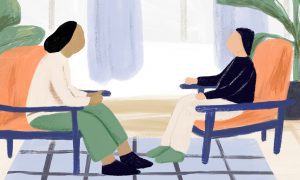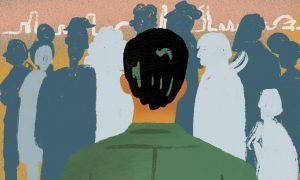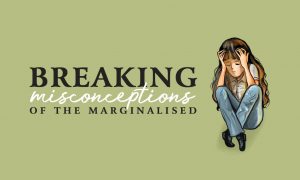What It’s Like to Slowly Climb Out of Depression
Written by CT Cue, Philippines
I don’t know exactly when it started, but ever since I was young, I instinctively knew to mask my emotions. I’d tell people I was okay even when I wasn’t. I was afraid of letting others in and getting disappointed, until I became very lonely.
It all came to a head during the pandemic, when all the emotional turmoil I’d been experiencing for years started to manifest as physical symptoms. I’d always feel like crying but I couldn’t pinpoint why. I felt like I had no control over my body—my heart was always beating too fast, head pounding, eyes constantly twitching. I found myself immobilised by fear as all kinds of dark thoughts ran through my head.
So I wrote to my school’s guidance centre to ask for a counselling session. I met the counsellor over Zoom, we did breathing exercises, then I started to bawl my eyes out, which brought me a sense of relief. It felt like the Lord met me where I was. From there, I started to pray more honestly by telling the Lord all my thoughts, especially ones I didn’t dare tell anyone else.
As I prayed, the Lord ministered to me by teaching me to take care of my body, and to trust Him to provide what I needed. I started to eat better, get enough sleep, and exercise. To keep my mind from spiralling, I began to spend more time on God’s Word and listen to faith-based podcasts, while also picking up new hobbies.
When I entered college, I thought I was getting better. I felt like I had developed better habits and was having fewer panic attacks, and since I had not gotten an official diagnosis, I figured my mental struggle would eventually go away on its own.
But I began to feel burnt out in my second year. I constantly felt like I wasn’t doing enough compared to my classmates, so I’d work twice as hard to make up for it. Over time I became more forgetful and distracted; I would sit through my classes and nothing would register in my head. Things that used to bring me joy, like reading, writing, playing games, ended up frustrating me because I couldn’t do them properly.
I started to have more panic attacks again. Whenever I couldn’t sleep, I distracted myself by doom scrolling. My usual coping tactics—avoid coffee, sleep early, try to exercise and not overthink—stopped working. I kept praying, but nothing changed.
When I sensed that I had lost all motivation to live, I finally thought about getting professional help. But I still had reservations. Medication is expensive, plus I’d also heard about other people’s bad experiences with medication.
Deep down, I also felt that taking medication would mean admitting that something was wrong with me. I thought that getting a diagnosis would make it permanent, and I wouldn’t be able to live life normally anymore. All of these excuses held me back, until I realised that I couldn’t continue like this.
When I asked my parents if I could get a diagnosis, my mum said no, which made me upset. I thought of finding a psychiatrist on my own and paying for it myself. I also asked other people for advice.
But in the end, I felt that God wanted me to wait for permission from my parents, as the idea of doing it on my own did not sit well with me. So I prayed for the Lord to soften their hearts and open their eyes so they would see how much I’d been struggling.
Seeing God at Work
One day I had a breakdown, and I really needed someone to be there. I’d always hesitated going to my parents about these things, but as I struggled, I felt that God wanted me to give them a chance, to open up and let Him work. So I did.
After that, my parents finally allowed me to get help. I saw a psychiatrist for the first time and was diagnosed with depression.
I thought that knowing my condition would be enough for me to help myself. But having a diagnosis did not lessen my struggles or make them easier.
Just like how Paul prayed for the thorn in his flesh to be taken away (2 Corinthians 12:7-8), I begged the Lord to remove mine. But as He said it to Paul, He also said it to me: My power is made perfect in your weakness (2 Corinthians 12:9).
Instead of giving me a quick fix, God opened my eyes to see how He was working in my life. He surrounded me with friends who understood some of what I was going through; a sister in Christ who also went through the same thing; another sister who did not hesitate to speak life over me whenever I needed it; friends who would listen to my woes without attempting to fix me, and would point me back to the Lord and remind me to keep surrendering to Him.
It took some time after the diagnosis before I was brave enough to admit that I needed medication and ask for a prescription. But when I started taking the medication, it was not the “lifeline” I was expecting it to be. For the first few weeks I felt so weak, all I did was sleep. My body ran hotter than usual, which made me irritable.
Even so, the medicine did give me a bit of breathing space as it quieted my mind. I found myself sleeping more since I was more relaxed. I didn’t have to keep drowning out the noise in my head with music. Eventually I was able to concentrate again and actually enjoy my classes.
Getting treatment helped slow down the thoughts in my head so I could begin to segregate the lies from the truth. To counter the lie that I needed to be self-sufficient and help myself, God was telling me to trust Him—to let go of the notion that I could fix this on my own, and depend on Him and on my parents and friends.
As the medicine slowly improved my condition, I believed that that was God’s work too, that it was part of His healing process.
How God Continues to Lead Me
As I learned to trust God’s plan for my good and His glory (Romans 8:28), this lifted the longstanding pressure I felt to prove myself and be everything to everyone. When I couldn’t see a future for myself, God placed desires in my heart that nudged me to slowly get out of my comfort zone.
Before I got diagnosed, I had been preparing to serve as president of a student organisation. I was worried I might not be able to continue with the job, so I decided to sign up for the university’s accommodations programme that offers support to students with disabilities—they inform the professors about their student’s situation (i.e., health condition) so the professors would be more understanding and would offer deadline extensions as necessary.
I was initially afraid that they would no longer allow me to serve in the organisation, but thankfully, my professor and the school counsellor assured me that I needn’t worry and that it would be good for me to have support. Hearing this made me hopeful and thankful to the Lord for His faithfulness.
Even though I was not in the best condition, God gave me this opportunity to grow and serve as a student leader. Every time I was tempted to throw in the towel, He would send someone to ask me questions so I could be of help, which reminded me why I wanted to be involved in the first place—to help others and create safe spaces for people to gather, share stories, and listen to one another. It surprises me that I’m now doing things I never expected to, like hosting events or opening up about my mental health.
I started to find myself enjoying life again as I learned to show compassion to myself and balance my studies, extracurricular work, personal life, and spiritual life. My relationship with my parents has improved, and I’ve been able to show up more for my friends and to be really present whenever I hang out with them.
I am not writing this because I’ve finally overcome depression. Some days I still get moody, sad, irritable, and even mean with my words. I’m still taking medication.
To keep my head from spinning too far out of reach, I would do a soothing exercise (like gently tap my nose or rub my arm) and repeat the phrases such as “God will protect me, God will not forsake me, God will always be there for me” to ease my thoughts.
It’s an ongoing battle, but I’m not facing it alone. God finds ways to bring me joy, reminding me that there are good people out there and that there is so much love He’s put inside me just waiting to be poured out.
This verse gives me comfort and strength: “I will not die but live, and will proclaim what the Lord has done” (Psalm 118:17). I don’t just want to live for the sake of being alive; I want to truly live the life God has for me (John 10:10), with Him by my side.


















Well written! May this be of help to people who are in the same situation, struggling in their everyday lives. Pardon me for asking, is this a real personal story?
Yes, this is a real personal story 🙂